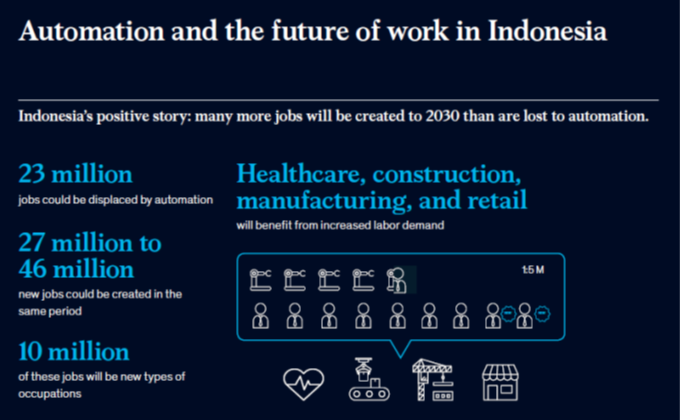“Indonesia’s jobs story can be a positive one. Automation has the potential to raise productivity and GDP growth, and to generate higher incomes for Indonesian workers and market opportunities for Indonesian companies. While as many as 23 million jobs could be displaced by automation in Indonesia by 2030, between 27 million and 46 million new jobs could be created in the same period.” ~ McKinsey & Company

Automation technologies are changing the workplace, providing a significant opportunity for nations and companies to boost productivity, efficiency, and growth. At the same time, they are altering the nature of work. Successfully harnessing these technologies will create jobs, but it will also displace others and change many occupations. A report of McKinsey & Company (2019), titled Automation and The Future of Work in Indonesia ─ authored by Kaushik Das, Phillia Wibowo, Michael Chui, Vishal Agarwal, and Vivek Lathwhich ─, draws on their global research into how technology is affecting the economy, business, and society, focuses on the implications of automation adoption for Indonesia. Here are their key findings:
– Automation has the potential to raise productivity and GDP growth in Indonesia and generate higher incomes for workers and market opportunities for companies. The positive economic impact could help Indonesia accelerate its growth trajectory, creating jobs for many of the 25 million new entrants to the country’s labor force by 2030.

– While some jobs in Indonesia may be displaced by automation, many more will be added to the economy by 2030, likely leading to a net gain. About 16 percent of the total hours worked in Indonesia could be automated by adopting demonstrated technologies, according to a scenario that takes the midpoint in our range for the pace of automation adoption. These lost jobs could be more than compensated for by new labor demand, especially from rising incomes and increased spending on infrastructure and other sectors. They estimate that these factors could lead to a net gain in Indonesia of between four million and 23 million jobs by 2030. This figure includes 10 million jobs in new occupations that do not exist today, in line with past trends of innovation generating new forms of work.
– Indonesia is already successfully harnessing the digital revolution to some degree. Companies such as Go-Jek and Grab are continuing to grow, providing job opportunities to Indonesia’s underemployed and unemployed population. Online commerce is another example of how new technologies are creating work. By 2022, they estimate that online commerce could directly or indirectly support up to 26 million full-time-equivalent jobs. These examples highlight Indonesia’s entrepreneurial dynamism and willingness to adapt, but they are just a start: much more can be done to harness the new technologies.
– Employment growth is likely to change the mix of sectors in the Indonesian economy as a whole. Construction and manufacturing could see growing demand for labor, as could accommodation and food service, education, healthcare, and retail and wholesale trade. However, some occupations that involve routine, predictable work could be susceptible to automation, including collecting and processing data.
– New skills will be needed for the automation age. These include technological skills, but also social and emotional and higher cognitive skills such as creativity and advanced problem solving. Indonesians who complete secondary education will likely see the largest net change in employment to 2030, but in percentage terms, the greatest opportunities will be for those who have college or advanced education. This creates an important challenge for the country’s education sector.
– Indonesia will need proactive strategies to adopt artificial intelligence (AI) and automation to remain competitive in the global and ASEAN marketplace. All stakeholders, including policy makers, academic institutions, NGOs, and business leaders, will need to prepare for substantial changes affecting the future of work. Companies must start planning for, and transitioning into, the future of work now, with long-term learning programs both for people affected today and those possibly affected in the future.
The report among others conclude the importance of promoting entrepreneurship at scale. Entrepreneurship and more rapid new business formation will not only boost productivity, but also drive job creation. Startups and SMEs
employ far more people than large enterprises. For a country like Indonesia, encouraging growth of startups and SMEs can help create jobs at scale. Online commerce has already had a major impact on Indonesia’s job market. It is giving a boost to Indonesia’s jewelry sector; artisans in traditional production centers such as Bali and Yogyakarta sell their products to digitally savvy local aggregators, who then resell to overseas retailers. *** (PX) (Source: McKinsey & Company, 2019)


Recent Comments